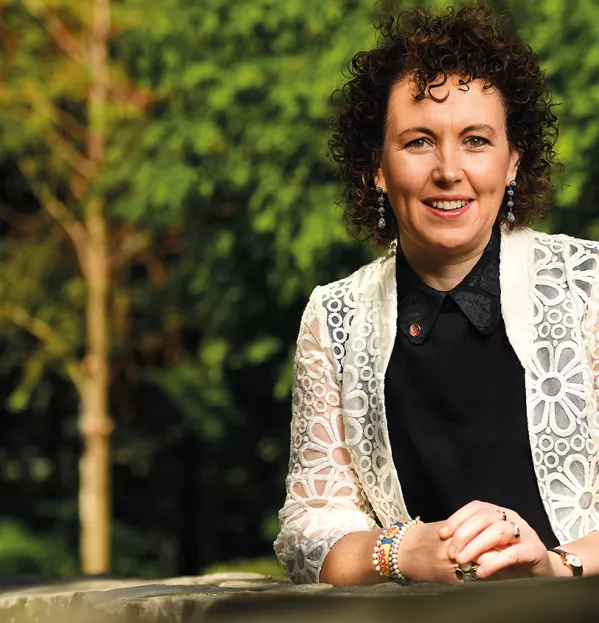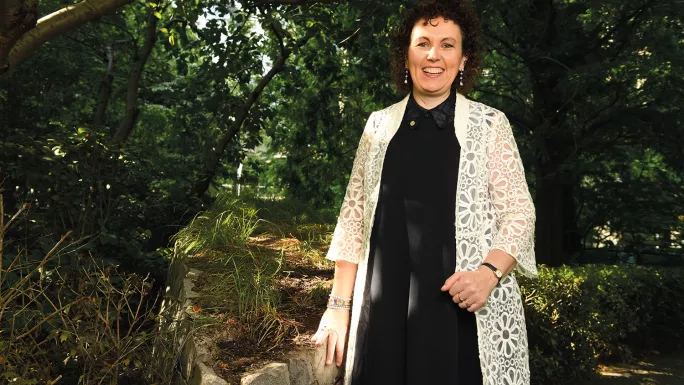‘We must not try to turn teachers into mental health experts’

Catherine Roche is at forefront of one of the biggest challenges facing schools today - a growing demand for mental health services when budgets are squeezed.
As chief executive officer of counselling service Place2Be, she is currently “throwing everything” at making the argument for funding mental health support in schools. On the positive side, Roche has plenty to draw on when making her case.
There are the figures - a recent analysis of the charity’s impact found that every £1 spent on one-to-one counselling in primary schools reaped a long-term benefit of £6.20.
There are the stories of children the charity has helped. Case studies of children like Sameer, whose home was destroyed in a fire when he was 6, leaving him traumatised. His teacher referred him for weekly emotional support sessions with a Place2Be counsellor.
Initially, in these sessions, he would not talk and set up furniture in a doll’s house only to destroy it. Place2Be gave him time and space to express his feelings about what had happened to him. By the end of the year, he had become noticeably calmer, and eventually he was able to speak freely and play without fear or anger.

And then there is the royal patronage. Roche believes that Heads Together, the mental health campaign launched last year by the Duke and Duchess of Cambridge and Prince Harry, proved a turning point in raising awareness of the issue. The Duchess of Cambridge is also a patron of Place2Be.
“Without a doubt, mental health has been in the shadows,” Roche says. “I think schools have always recognised [the importance of mental health] ... But there has been a huge stigma around mental health and what that meant and, for a few years, there was so much more focus on academic progress in the education system. I think that has shifted, thankfully, in this last year or 18 months.”
She supports the need of schools to focus on learning but says that to do this successfully schools also need to support children’s wellbeing. “You need to have a balance to help a child develop to their full potential,” she says. “You want to create a mentally healthy school … an environment where they feel comfortable and safe.”
Roche remembers her early school days in rural Ireland as happy and creative. She was brought up on a dairy farm in County Waterford, the third of four children and the only girl. She went to Ballinameela primary, a small school with just four teachers and saucepans on the floor to catch drips from a leaking roof.
Above all, she remembers a sense of community and belonging, with the walls of one building decorated with bits of leftover wallpaper brought in by children in the school. “So the wall was full of different bits of wallpapers and kids would say ‘that’s ours’, ‘that’s ours’,” she recalls.
Roche particularly loved science and maths, and was excited about going to secondary school, St Anne’s in the nearby town of Cappoquin, to do “proper science” rather than the “nature” she had studied in primary.
Freedom of choice
It was only when she was applying for university to do science - as her father and older brother had done before her - that her English teacher asked her why she had chosen it.
“She said, ‘What are you doing science for? You should do English.’ Because I loved Shakespeare. I hadn’t thought of doing anything other than science. Then I thought, ‘I don’t really like physics,’ and that got me thinking,” Roche says. “That was the first time I’d thought, ‘What do I want to do?’”
So she took her own path - a BA in English and French at Cork University, followed by a postgraduate diploma in education.
Roche’s teaching placement was spent trying to enthuse teenage girls about French verbs, but now - with hindsight - she wonders what she may have missed about their wider wellbeing. “I can still picture those girls who were in my classroom during my teacher training year,” she says. “And I now think, ‘Oh heavens above, what did I not spot or flag about certain children in that classroom?’
“You’re parachuted in, you’re so focused on the learning that you’re trying to get across - but you have got these children in front of you, for so many hours in the day. And you’re the one who is so well placed to pick up if there is something going on.”
But she is also clear that while training teaching staff to be aware of mental health issues is helpful, there is a limit to what teachers should be expected to do.
The government proposed changes to children’s mental health services in a Green Paper published in December. It contains three key elements: decreasing waiting times for specialist services, having a “senior lead” on mental health in each school and creating new NHS mental health support teams linked to schools to support mild to moderate mental health needs.
“The challenge we see is around how skilled those mental health support teams will be,” Roche says. “Having people adequately skilled and trained in those teams and having enough of them is a key point. We must not try to turn education professionals into mental health experts. That is why we need to have accessible professionals because we can’t keep loading stuff on and say it is schools’ or teachers’ responsibility. You need to have access to that expertise.”
When Roche began her own teaching career, she saw it as fall-back position. But it turned out to be an astute move that led, in a very roundabout way, to her first encounter with Place2Be and its founder, Dame Benita Refson. Roche wanted to move to France, where she had spent her summers working as an au pair during her degree, and knew a teaching qualification would help her get a job there. So after qualifying, she became an English teacher in a secondary school in the Nord-Pas-de-Calais area (“I loved it,” she says).
Next she moved on to adult education, also in northern France, where she helped to create English immersion courses for business people, enhancing the curriculum with real English tea and biscuits from the newly opened Marks and Spencer in Lille.
After becoming interested in business itself, Roche decided to go back to studying. First in Ireland, where she gained a diploma in business, and then at Boston College in the US for an MBA. Later she moved to London to join KPMG as a management consultant.
“We did pro bono work at KPMG,” Roche says. “And my boss said, ‘Catherine, here’s a funny little project all about schools. You used to be a teacher. Try this one out.’”
That was when Roche first met Dame Benita, then simply known as Benny, and she was struck by the passion the Place2Be team had for their work with schools. “I remember visiting a number of schools who were interested in having this service,” Roche says. “And it was just so clear how much this service was adding, how important it was, what a gap it was filling within these schools.
“You knew, whatever they were doing, it was something so valuable, so necessary, so missing and well outside your comfort zone as a teacher.”
Crucial counselling
After helping Place2Be to create a plan to grow the charity, Roche moved on to her next project. But five years later - after she had left KPMG and set up a management consultancy with a former colleague - “it was fun, but terrifying” - Place2Be cropped up again.
She had kept in touch, and created the charity’s business plan. And now, after a career spent moving from project to project and with an impending marriage, Roche wanted to focus. So she applied for the newly-created role of Place2Be’s chief operating officer. “That was the first of the two most scary interviews I have ever done in life,” she says. “I was putting myself out there for it - it was a genuine competitive process. I was appointed COO and did that for 10 years.”
The second scary interview was for the CEO role. She got that, too. And by this time, having had her son Louis in 2009, she was gaining an even deeper personal interest in England’s school system.
Place2Be now works with more than 300 schools throughout the country offering counselling for children, and training for school leaders in how to create “mentally healthy” schools, and for teachers in how to support children’s wellbeing, resilience and self-belief.
But while the importance of child mental health may have come out of the shadows, the statistics are still alarming. The government’s Green Paper reported that around one in 10 children had some form of mental health disorder - rising to an estimated 45 per cent of looked-after children. Self-harm increased in girls aged 13-16 by 68 per cent between 2011 and 2014, and there are high rates of mental illness for young people who are not in education, employment or training.
Roche thinks that it is positive that the government is focusing on these problems and agrees with the three key elements in its strategy - but is suspending her final judgement until it is known how much funding is behind the scheme. “A real risk in [the Green Paper] is that, at a time when school budgets are under huge pressure, how do you ensure that existing quality services in schools are not displaced?” she says.
But taking on challenges is what Roche does. And she’s not doing it alone.
“[We’ll do] whatever it takes to make the strongest possible case,” she says. “It’s that combination of logical argument, the finances, the stats, the evidence, the data to back up what we do.
“That’s what we’ve been building, building, building for over 20-odd years. Now, with Heads Together, with collaboration, with some of the other charities within the sector, it does feel like there’s a bit of shoulder power to just keep pushing it all forwards.”
You need a Tes subscription to read this article
Subscribe now to read this article and get other subscriber-only content:
- Unlimited access to all Tes magazine content
- Exclusive subscriber-only stories
- Award-winning email newsletters
Already a subscriber? Log in
You need a subscription to read this article
Subscribe now to read this article and get other subscriber-only content, including:
- Unlimited access to all Tes magazine content
- Exclusive subscriber-only stories
- Award-winning email newsletters